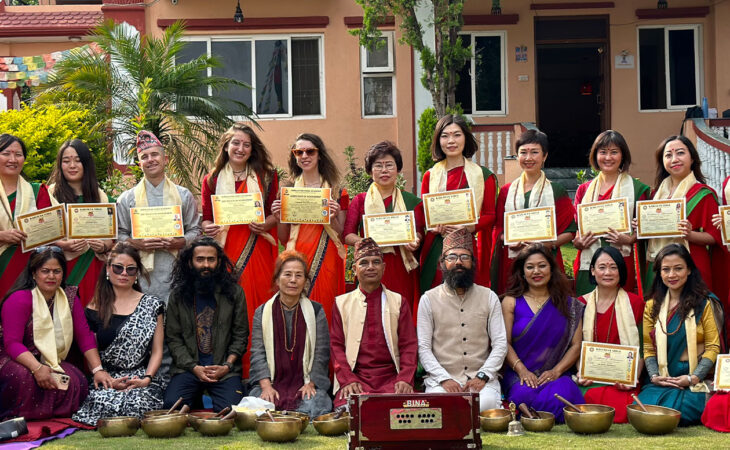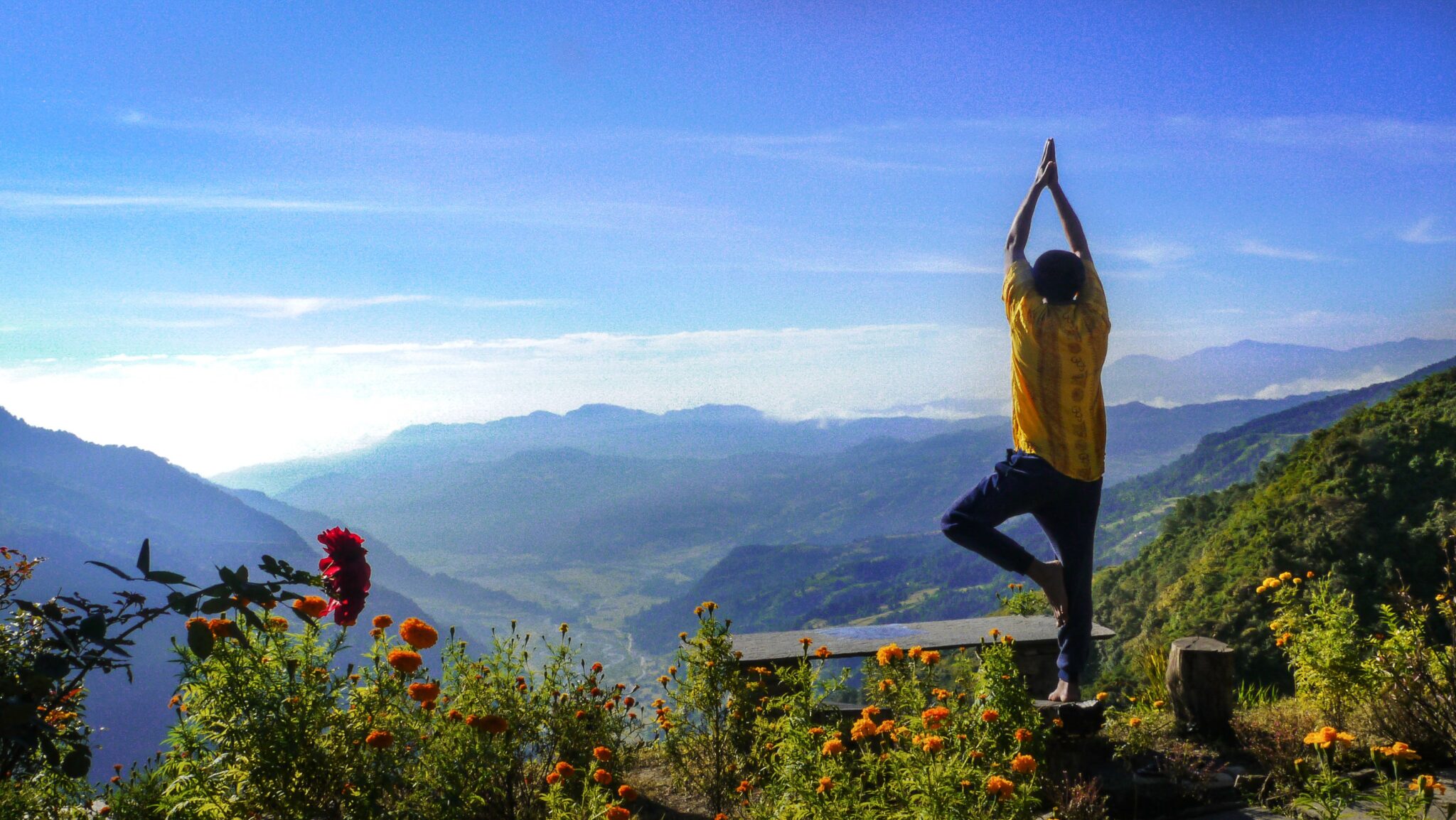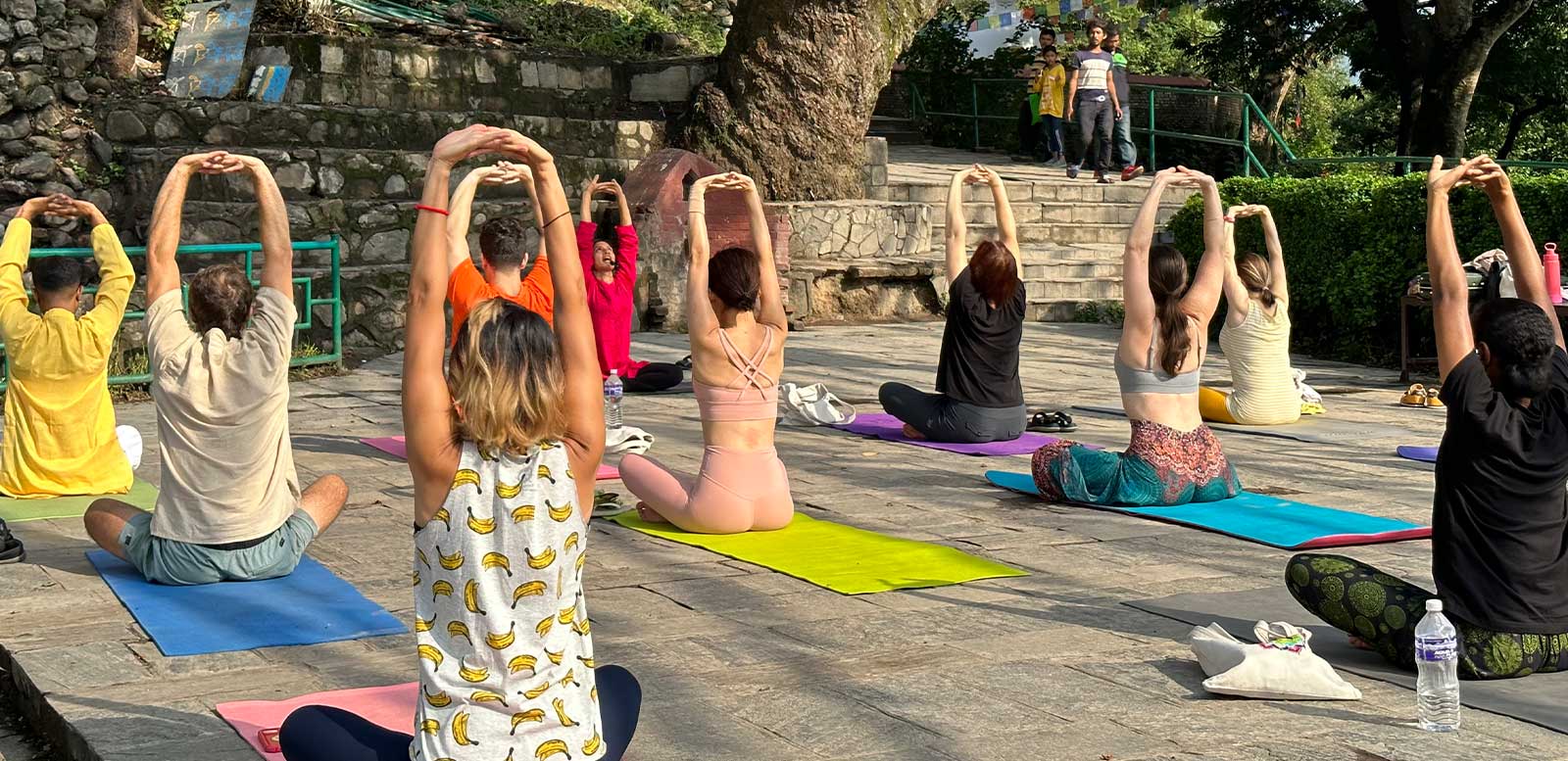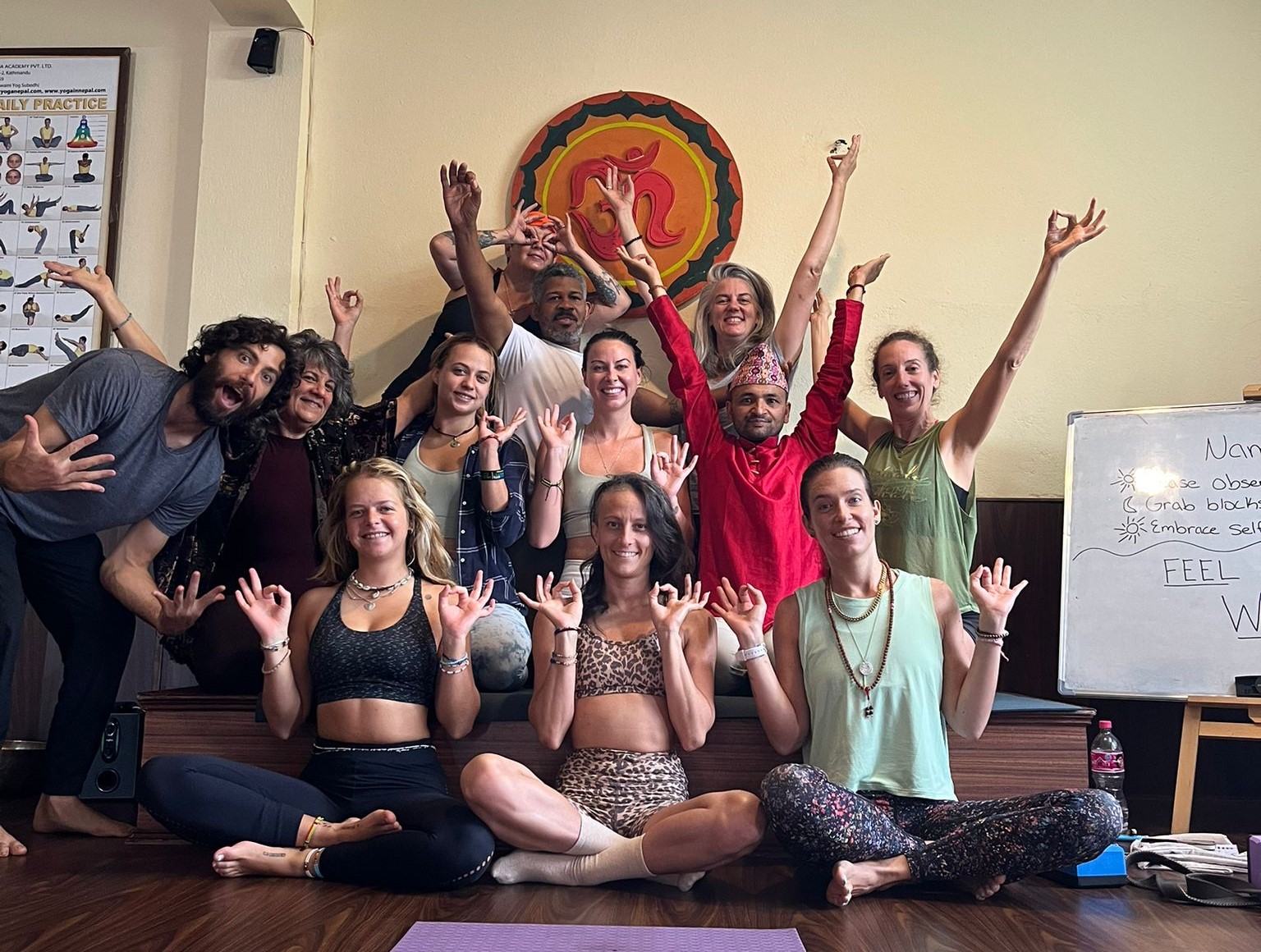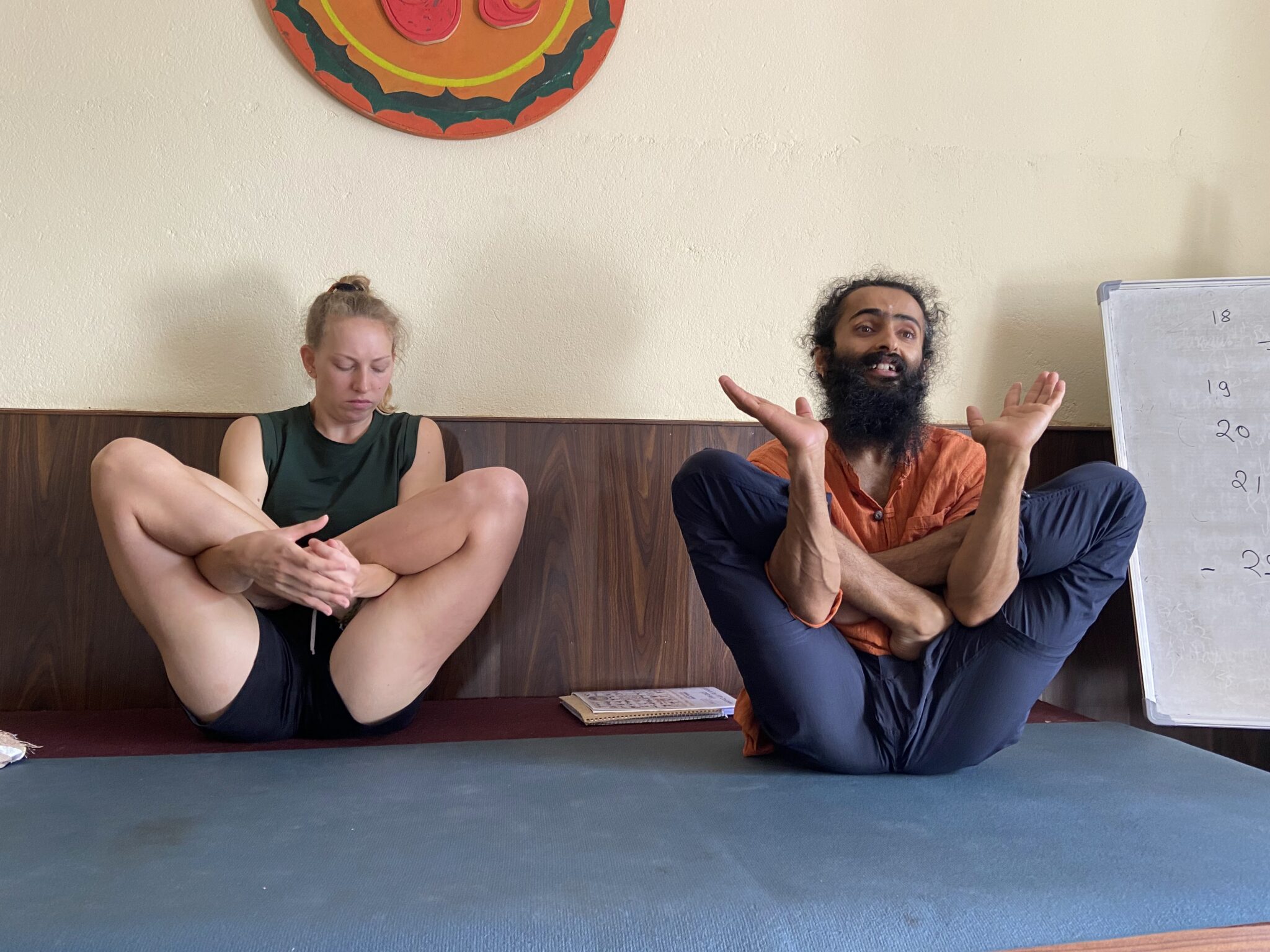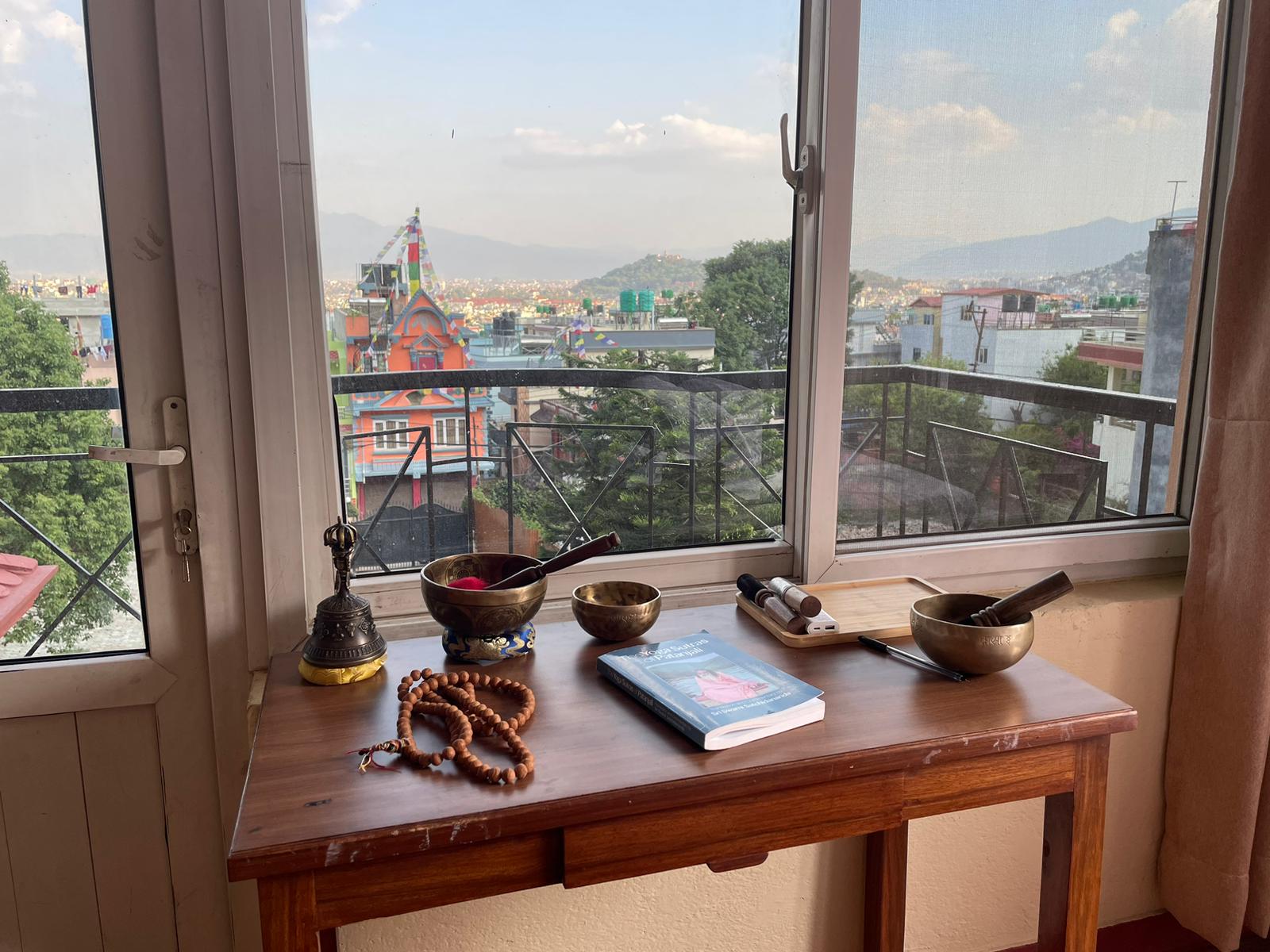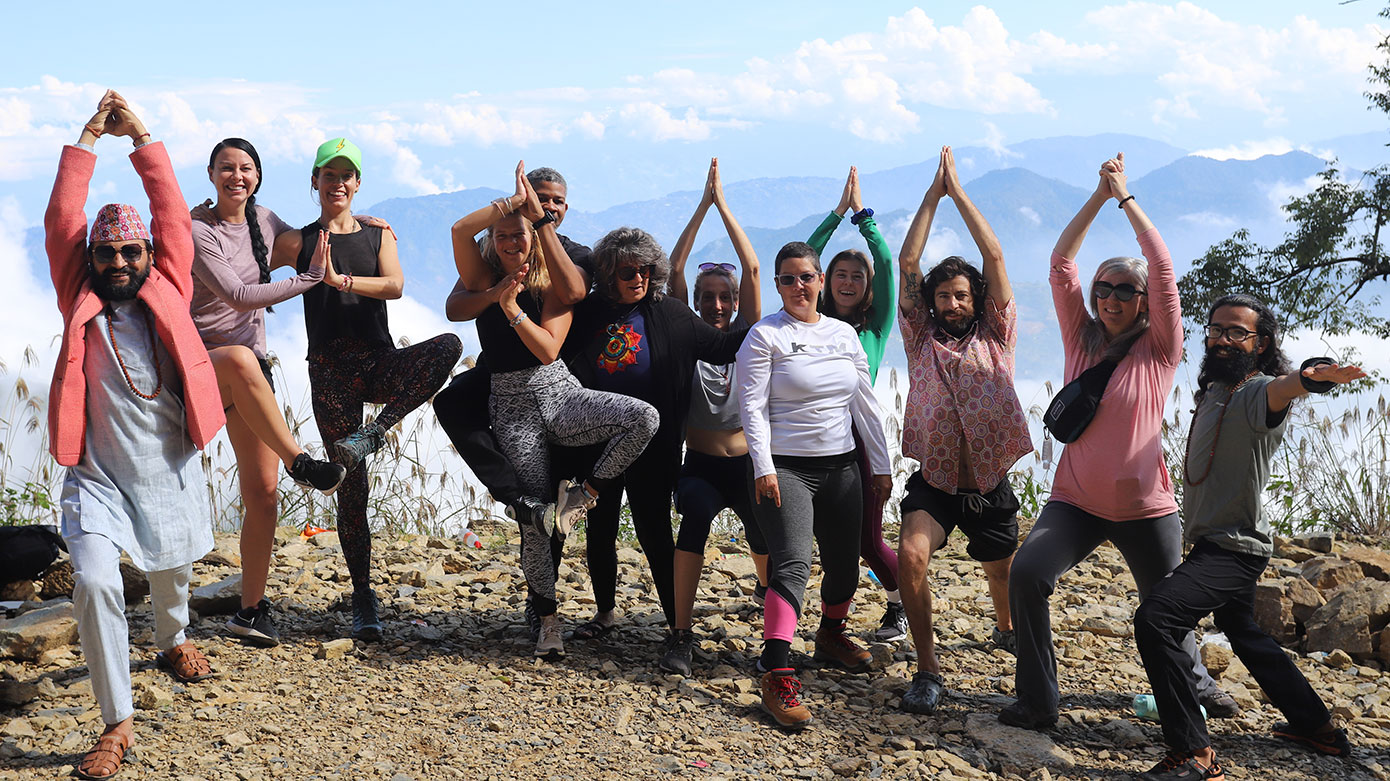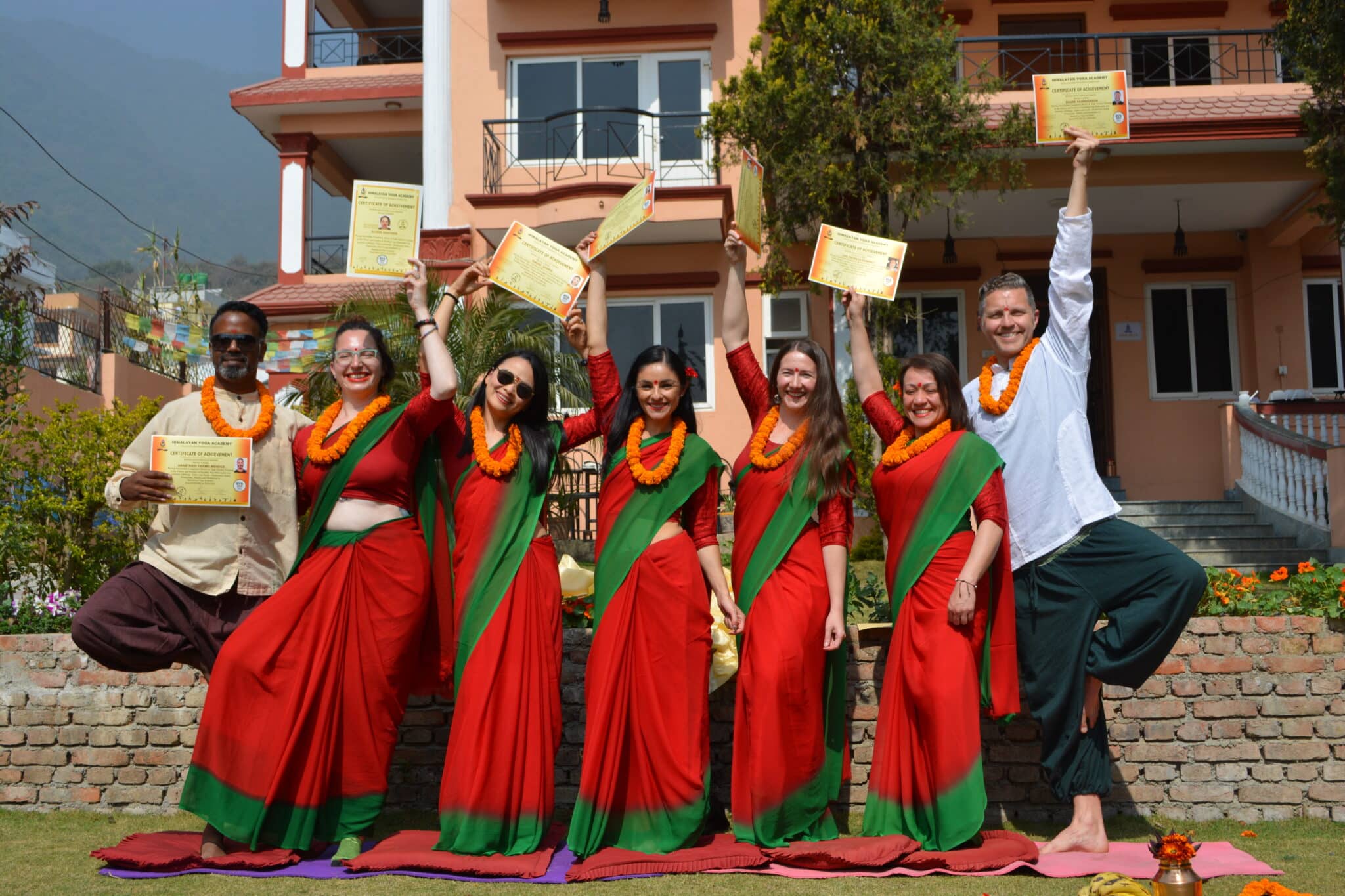500-Hour Yoga Teacher Training in Nepal
Come And Join Us For The Unforgettable Experience Of A Lifetime
Duration: 30 Days
Course Level
-
Beginner
-
Intermediate
-
Advance
Language of Instruction: English
The 500-Hour Yoga Teacher Training in Nepal allows you to cover the full spectrum of Yoga Alliance USA-certified training in one go. On completion of this training, you can register with Yoga Alliance as an RYT-500 teacher. This is an intensive course that will give you knowledge and understanding of asanas, teaching methodology, anatomy and physiology, the philosophy of yoga, and sufficient practice to be able to start teaching with confidence. You’ll find Yoga centers and Yoga teacher training schools across the world but, what better than getting trained in the land of Yoga? Yoga enthusiasts from across the world come to Nepal to enhance their practice of the ancient discipline of Yoga. Himalayan Yoga Academy offers one of the most reputed certified 500-hour yoga teacher training in Nepal. The training aims at reaching out to yoga enthusiasts with an opportunity to improve their skills and nurture the yogi within.
These 30 days 500 Hour yoga teacher training course which is the combination of a 200-hour yoga teacher training course + 300 Hour yoga teacher training course = 500 Hours of yoga teacher training in Nepal course, provides advanced yoga education to make them ready to come out as accomplished teachers
After completing the whole 500-Hour Yoga Teacher Training Course in Nepal Program you can feel the life-changing experience that will be benefitted you in a quite positive way. Specially designed for yoga seekers all around the world, this 500-Hour Yoga TTC in Nepal will take you to the depth of knowledge of yoga. Certainly, this course will strengthen your practice and learning of yoga and further builds your existing skills in the yogic field in a short period with an intensive time schedule to harness oneself and learn true yoga from the true yogis. It covers Traditional Hatha Yoga, Kundalini Yoga, Vinyasa Yoga, Ashtanga Yoga, Dhyana Yoga, and Yoga Philosophy.
What does this 500 hour yoga teacher training in Nepal give?
Unlocking the most powerful yoga course that may be the key to unlocking success. Our 500-hour yoga retreat sessions can give you a unique chance to learn from some of the experienced instructors of Nepal ( the land of the Himalayas ) who have read and experienced yoga and apply that knowledge to become a yoga instructor. On top of this, they provide a peaceful reprieve from hectic modern life so you won’t feel exhausted anymore! For many, the practice of yoga starts with a journey that focuses on physicality. But this is only scratching the surface; you must dig in to understand the true power of yoga!
Highlights of 30 Days 500 Hour Yoga Teacher Training in Nepal:
This 500-hour yoga teacher training course is recommended for all walks of life people, this is the best yoga course and a completely self-transforming learning experience, even a little bit experience of in yoga will definitely bring a life-changing experience so give yourself 30 Days to learn how to transform millions of lives, it is the dream of millions.
- Heighten your learning and practice Hatha, Vinyasa, and Ashtanga Yoga practice
- Learn teaching methodology for, Pranayama (breath control), and Dhyana (meditation).
- An in-depth study of the Yog Sutra of Patanjali, Hatha Yoga Pradipika, and many other yogic texts which will bring an understanding of the philosophy and practice of yoga.
- Enhance your knowledge of human anatomy and physiology and its correlation to yogic practices.
- To learn about the Yogic Postural knowledge & Injury avoidance
- To Learn Yogic Ethics and as well as harness your yoga teaching skills
Day Schedules
06:00 am – Wake up and Herbal Tea
06:30 am–8:30 am – Hatha Yoga Asana and Pranayama
08:30 - 09:30 am – Breakfast
10:00 - 11:15 am – Yoga Philosophy
11:30- 1:00 pm- - Alignment and Adjustment
01:00-02:00 pm - Vegetarian Lunch and Herbal Tea
02:00-03:00 pm - Library / Self-study
03:30-05:30 pm - Ashtanga Vinyasa
06:00 - 07:00 pm – Meditation
07:00 - 07:30 pm – Dinner and Herbal Tea
07:30 - 08:30 pm – Free time. Group Talks and Discussion
08:30 pm – Evening walk, Vajrasana, Self-study & Practice
10:00 pm – Bedtime (Lights out)
Course Syllabus
Prayer: Om chant, Mantra prayer and Chanting
Jogging; Subtle exercise, Dynamic (warm up) exercise, Spinal exercise and Suryanamaskar (Traditional and integrated form both)
Satkarma: Dhauti, Basti, Neti, Nauli, Tratak and Kapalbhati
Asana (postures): Meditative postures, Relaxing Postures, Balancing Postures, Fitness maintaining
Postures, Inverted postures,
Additional Package: Upa Yoga Capsule, Ashtanga Vinyasa Primary Series Asanas.
Body Alignment in Yoga
Yoga safety guidelines
Mudra, Bandha and Pranayama (Breathing Ethics)
Yoga nidra (Yogic Sleep) and Dhyana (Meditation)
Guided Teaching Practice
Communication skills such as group dynamics, time management, and the establishment of priorities and boundaries
How to address the specific needs of individuals and special populations, to the degree possible in a group setting
Principles of demonstration, observation, assisting and correcting
Teaching styles and Qualities of a teacher
The student learning process
Business aspects of teaching yoga (including marketing and legal)
Constituents of Human Body: Cells, Tissues, Organs,Terminologies;
System of Protection and Movement of bones, joints, muscles, Flexibility, Efficiency, Body Alignment,
System of Intake of raw materials and the elimination e.g Digestive, Respiratory, Excretory;
Communication and Immune system-Cardiovascular, Nervous, Endocrine, Lymphatic;
Spiritual anatomy and physiology: Pancha kosa, Chakras, Physical and spiritual Nadis, Kundalini power etc.
The brief study of yoga philosophies and traditional texts: Meaning, Definition and History of Yoga, Biography of some yogic Rishis such as Lord Shiva, Patanjali;
Brief introduction of the Yoga Sutras, Hatha Pradipika and Gherand Samhita;
Forms of yoga: Karma yoga, Bhakti yoga, Gyana yoga, Dhyana yoga, Mantra yoga, Hatha yoga, Kundalini Yoga, Ashtanga Yoga
Yogic Lifestyle: Day Regimen, Night Regimen and Seasonal Regimen, Aahara – Vihaara – Vichaara – Vishraama;
Ethics: Yama (social ethics): eg. Ahimsa (non-violence), Satya (truthfulness); Asteya (non-stealing), Aparigraha (non-possessiveness), Bhrahmacharya (True nature),Niyama (individual ethics): eg. Shouch (purification); Santosha (contentment), Tapa (tenacity), Swadhyaya (self study), Ishwor pranidhan (self surrender to god)
Concepts of Dharma and Karma, Bondage and Moksha
Yogic Aahara / Sattvic Food, Rules of healthy food habits
Ethics for yoga teachers, such as those involving teacher – student relationships and community
Understanding the value of teaching yoga as a service and being of service to others (seva)
Practice teaching as the lead instructor
Receiving and giving feedback
Observing others teaching
Assisting students while someone else is teaching
Remaining Contact Hours and Elective Hours
The remaining Contact Hours (55 hours) and elective hours (15 hours, either contact or non-contact) are to be distributed among the five educational categories, but the hours may be allocated at the discretion of each RYS based on their program’s focus.
Prayer, Subtle exercise, Dynamic (warm up) exercise, suryanamaskar (traditional and integrated base), Spinal exerciseSatkarma- Shankhaprakshalana Kriya, Asana (postures): meditative postures, Relaxing Postures, Balancing Postures and cultural Asanas; Ashtanga Vinyasa Intermediate Asanas; Tibetan Five Rites Asanas and body alignment in yoga Mudra and Bandha; Pranayama(Breath ethics),
Advance Form of Yoga nidra (Psychic sleep), Mantra practice, Kundalini Yoga
Dhyan (Meditation): Process and models of meditation
Guided teaching practice
Developing practices integrating the various tools of yoga
Therapeutic Yoga on Common Diseases
Yoga safety guidelines
Developing practices integrating the various tools of yoga, developing practices focusing on specific needs of an individual/group.
Communication skills such as group dynamics, time management, and the establishment of priorities and boundaries
How to address the specific needs of individuals and special populations, to the degree possible in a group setting
Principles of demonstration, observation, assisting and correcting
Teaching styles and Setting up classes
Qualities of a teacher and the student's process of learning, business skills
The student learning process
Business aspects of teaching yoga (including marketing and legal)
Principles of demonstration and Instruction-cueing,
Teaching styles Business skills and Communication skills
Observation, assisting and correcting
Learning to observe, demonstrate, motivate, be inclusive and adapt to individual needsIncludes approaches to teaching from other styles or schools.
Design Yoga class for Special Population (basic seniors, official, pregnancy, and children yoga safety)
- Constituents of Human Body: Cells, tissues, terminologies Chemistry of human body, Body environment, Homeostasis, survival needs, Membrane and Glands on yogic principles.
- Structure of bones, synovial joints, Key muscles for asana effect, smooth muscles, Flexibility, Efficiency, Ideal Postures andalignment; movements. Mechanism of postures and yogic effects
- Physiology of Chemical Digestion, Position of Alimentary Canal, Asana Principles in Digestive system, Mechanism of Respiration, Air composition; Vital-R.R.
- Types of Circulation of blood and Physiological interrelationship of breathing and circulation; structure of blood vessels; blood composition, Vital- B.P. and P.R
- Hypothalamus and major Hormones; Immune organs and their functions and yogic concern; Reproduction and Reproduction physiology and karma
- Sympathetic and para-sympathetic neuro-body co-ordination and yogic concern;
- Health and Illness, hygienic yogic practices, yoga educational goal
- Yoga health benefits/contraindications must be covered in this section
- Kinesiology of yoga asana, contraindications, movement patterns
- Spiritual anatomy and physiology: Pancha kosa, types of spiritual Body Chakras, Physical and spiritual Nadis, Kundalini power, Aura etc.
- The brief study of yoga philosophies and traditional texts: Meaning, Definition, and History of Yoga, Biography of some yoga Rishis such as Lord Shiva, Gorakhanath, Patanjali Rishi, Brief study of the Yoga Sutras, Bhagavat Geeta and Sankhya Yoga,
- Types of yoga-: Karma, Bhakti, Gyana, Dhyana, Hatha, Ashtanga, Mantra, Laya, Kundalini, Raja,Yoga lifestyle: Day Regimen, Night Regimen, and Seasonal Regimen
- Ethics for Yoga Teachers
- Human Ethics: Yama (social ethics) eg Ahimsa (non-violence), Satya (truthfulness); Asteya (non-stealing), Aparigraha (non-possessiveness), Brahmacharya (True Nature)
- Niyama (individual ethics) eg.Shouch (purification); Santosha (contentment), Tapa (tenacity), Swadhyaya (self study), Ishwor pranidhan (self surrender to god),
- Jeevan Vigyan:the concepts of Dharma, Artha, Kama & Moksha. Trigunas , Karmaphal, yogic karma and its fruit, Bondage and liberation, Smriti, Samskaras, Vasanas
- Yogic Aahara/ Sattvic Food and healthy way of eating & drinking
- Basic concept of Nature Cure and Ayurveda
- Practice teaching as the lead instructor
- Receiving and giving feedback
- Observing others teaching
- Assisting students while someone else is teaching
500 Hour Yoga Teacher Training Course in Nepal Training Cost
Private Accommodation - USD 2200 per person Double Sharing Accommodation - USD 1900 per person Triple Sharing Accommodation - USD 1800 per person
Note: If you are in Group, ask for special rates
What's included?
30 Nights Accommodation; Attached Bathroom with Hot & Cold shower
Training Fees and Certificates
Towel and slippers
3 vegetarian or Vegan meals daily (Cultural Food on Festivals & Rituals)
Daily herbal tea as mentioned above, Drinking water
One Outdoor Excursion during the training
Library of yoga literature
Yoga Book-1, Notebook-1, Pen-1, Jalaneti pot-1
Airport Transfer (From Airport to HYA )
What's not included?
Airfare, any other local travel or sightseeing
Personal Expenditure
Laundry (available for extra charge)
Extra TherapiesCourse Dates:
500 Hours Advanced Yoga Teacher Training Course Dates
1st - 30th January
1st - 30th February
1st - 30th March
1st - 30th April
1st - 30th May
1st - 30th June
1st - 30th July
1st - 30th August
1st - 30th September
1st - 30th October
1st - 30th Novemebr
1st - 30th December
Programs Terms and Conditions/Refund Policy - 500 Hour Yoga Teacher Training in Nepal
All classes are mandatory only in case of an emergency or illness one can take leave with respected teacher permission. Uninformed leaves won’t be accepted and this will leave bad impression on student monthly performance.
Prerequisites- A high degree of self-motivation is required for all aspects of the course. The practice and especially the teaching of yoga demand a high degree of self-discipline and purity. To ensure the success of the program, participants are required to attend all spiritual activities, meditation sessions, lectures and asana classes. Meat, fish, eggs, coffee, alcohol, tobacco, drugs and nudity are prohibited during the course as they are counterproductive to the yoga practice. Participants who do not comply with the school rules may be dismissed from the course.
Discipline Rules for Students - Smoking and alcohol are strictly prohibited in the school. If you are having a fast any day, you have to inform kitchen manager for avoiding food waste. Always make discipline, respect teachers and follow all rules. Always be in the time, you are late means will not be permitted to join class. Clear your books of account before departure from Himalayan Yoga Academy. Before departure return your books, maps or any goods which you borrowed. Himalayan Yoga Academy provides accommodation for a student who join the yoga course. So, any friends or relatives will not be included in accommodation however they can stay in school by renting another room. Student have to be present in all scheduled program of Himalayan Yoga Academy.
Refund Policy – The course fees & Booking amount will be refundable if he/she cancels the course 30 days prior to the training. They can schedule the course anytime in the future. If student cancel the course after joining it, we accept cancellation but course fees will not be refund in cancellation.

